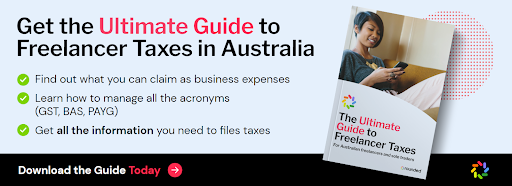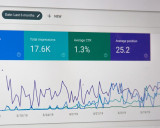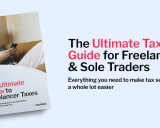
What is a sole trader?
Sole trader is an ambiguous phrase and often misused or confused with other similar titles. If you’re planning on starting your own business or working full time as a freelancer, it’s important to understand what a sole trader is.
Article contents
− +
In this article, we’ll break down the meaning of sole trader and explain how it differentiates from other similar terms. We’ll also look at the advantages and disadvantages of being a sole trader, so you can decide if it’s the right title and business structure for you.
A simple sole trader definition
A sole trader is someone who owns and operates a business in their own name. They keep all after-tax profits from their business, and they maintain full liability for the business.
Within Australia, “sole trader” is also a business structure, and it’s very common for freelancers and independent contractors to classify themselves as a sole trader when setting up their business.

The term “sole trader” is used throughout Australia, New Zealand, and the UK, but not in North America, where “sole proprietor” is more common.
It’s easy to get sole trader mixed up with other similar terms, so let’s break down the definition of sole trader further by comparing it to other business structures and titles.
Sole Trader vs. Company or Pty Ltd
When setting up your business and applying for an ABN in Australia, you’ll need to decide whether to classify yourself as a sole trader or a company.
These are two separate business structures, and the designation you choose will depend on whether you plan to trade under your own name or as a company.
A sole trader designation means the individual who owns and operates the business is a single entity in the eyes of the Australian Tax Office (ATO). As a sole trader, you will have a single Tax File Number (TFN) and a single ABN. You will register your business name under your own name, for example, “John Smith” or “John Smith t/as John Smith Photography.”
A company or Pty Ltd designation will mean the individual who owns the business is a separate legal entity from the business itself. The business will have its own Tax File Number and ABN. When you register your business name, you can register it under any available name you like, for example, “Lens and Filter Photography Pty Ltd”.
We’ll explain why you might choose sole trader or company when setting up your freelance business later on in this article. But to make more sense of this term, let’s compare sole trader to other business structures you might consider when starting a business.
Sole Trader vs. Partnership
In Australia, “partnership” is another structure you can choose when setting up a business. The primary difference is that a sole trader is a single person who owns and operates a business, whereas a partnership is a business owned by two or more people.
If you set up your business as a partnership, you won’t be solely liable if there are legal issues with your business—you will share the responsibility with any partners you have.
Similarly, if you ever want to change your business structure or dissolve the company, you will need to work closely with your partners. A sole trader, as they work alone, could make this decision independently.
Sole Trader vs. Freelancer or Self-Employed
You’ll often hear these three terms used interchangeably, because in many ways, they all describe the same thing: a person who owns and operates their own business.
Both “freelancer” and “self-employed” are more casual terms—they are not legal business structures in Australia. A freelancer describes anyone who offers products or services independently. It’s very common for freelancers in Australia to register as sole traders when they apply for an ABN.
“Self-employed” is a very broad term that can apply to anyone who predominantly works for themselves. They may be a freelancer, a business owner, a sole trader, or a contractor.
Sole trader advantages and disadvantages
Now that you have a better understanding of what a sole trader is, you may be wondering which one you should choose for your own business.
Let’s look at the pros and cons of being a sole trader, so you can make the best decision for yourself.
What are the advantages of being a sole trader?
Sole trader designations are simpler and less expensive
If you’re looking for a quick and easy way to start operating as a business, then choosing the sole trader structure might be the best option. Of all your choices, this one is the easiest to set up, and requires the least amount of time or investment. (In fact, there is no cost for getting an ABN as a sole trader.)
Filing taxes is easier as a sole trader
If you operate as a company or Pty Ltd, you’ll have to file both personal taxes and taxes for your business. Because sole traders are the same legal entity as their business, they only have to file one set of taxes at the end of the financial year.

Sole traders aren’t required to make super contributions
Sole traders are not required to make any super contributions (not even for themselves). Companies and Pty Ltd organisations are required to make super contributions for employees.
What are the disadvantages of being a sole trader?
Sole traders have greater legal liability
The primary disadvantage of being a sole trader relates to liability for your business if something goes wrong. Should your business end up in legal or financial trouble, you (and your personal assets) would be at risk.
This means you could be responsible for paying out of pocket to cover legal fees or other expenses related to your business. Businesses and Pty Ltd owners, however, have more protection as they are not the same legal entity as the business they own.
Sole traders pay higher taxes
As a sole trader, you’ll pay a personal income tax rate, which can go up to 45%. The full tax rate for companies is 30%.
Sole traders may miss out on Super payments
As we mentioned above, one of the sole trader advantages is not having to make Super payments. However, just because it isn’t required doesn’t mean it’s not a good idea to do so. Sole traders who aren’t diligent about setting aside Superannuation for themselves may be unable to retire when or as comfortably as they’d like.
You can learn more about this in our Guide to Sole Trader Superannuation.
Making the decision to be a sole trader or company
Ultimately, the choice between sole trader or Company/Pty Ltd is yours to make. And remember, you can always change the structure of your company later on (though it may take a bit of paperwork).
Consider whether you want to be considered the same legal entity as your business, or would prefer to have separation (and more protection). Think about whether simple taxes and lower fees are important to you, and whether you’ll be able to diligently set aside money in your own Super—if so, sole trader designation may be the right choice.
Sole traders who use Rounded are one step ahead of the game when it comes to taxes and finance. Our software makes it easy to keep an eye on your annual and quarterly income, and you can generate a business activity statement with just a few clicks.
Curious to know more? Start a free 14-day trial here.
Cover Photo by Callum Hill on Unsplash
Join newsletter
ABOUT ROUNDED
Invoicing and accounting software for sole traders. Get paid faster and relax at tax time.


























-p-1600.jpeg)
